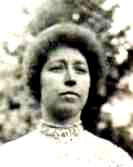
Catherine Mahon
Carrig N.S.
Women were less likely to join trade unions than men, for various reasons.
 Catherine Mahon Carrig N.S. |
Catherine Mahon, NT challenged the stereotype of the passive woman when she took an active part in the INTO, a union for national teachers and was elected first woman president of the union for two terms from 1912-1914. |
Traditional views about women in employment prevailed in the Irish Transport and General Workers' Union (ITGWU) and Jim Larkin was unwilling or unable to challenge them. With his encouragement in 1911, his sister Delia Larkin founded the Irish Women Workers' Union (IWWU) which soon had a thousand members. At an early meeting Constance Markievicz broke the 'meek woman' taboo to a 'chorus of laughter.'
|
Without organisation you can do nothing and the purpose of this meeting is to form you into an army of fighters ... As you are all aware, women have at present no vote, but a union such as has now been formed will not alone help you to obtain better wages, but will also be a great means of helping you to get votes ... and thus make men of you all. |
The IWWU took part in the Dublin Lock-out in 1913. A week after the strike began,
| ... three Jacob's [Biscuit Factory] workers were sacked for refusing to remove their union badges. Two hundred and fifty other women followed suit ... Dock workers refused to handle Jacob's goods and a domino effect began ... Medb Ruane (ed.), Ten Dublin women, Dublin 1991, p.43. |
Delia Larkin, together with Constance Markievicz organised a soup kitchen in Liberty Hall where about 3,000 people were fed.
|
Louie Bennett, an active suffragist, became secretary of the IWWU in 1917, a job she held until 1955. The IWWU opposed the Conditions of Employment Act (1935) and the 1937 Constitution, though Louie Bennett held traditional views on women in employment and agreed with preferential treatment for married male workers. In 1945, the IWWU led the strike of 1,500 laundry workers which established the right of all workers to two weeks annual holidays.
|
Louie Bennett was commemorated on a postage stamp Reproduced by kind permission of An Post © |